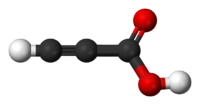Propiolic acid
 | |
 | |
| Names | |
|---|---|
| IUPAC name
2-Propynoic acid | |
| Other names
Acetylene carboxylic acid, Propargylic acid, 'acetylene mono-carboxylic acid | |
| Identifiers | |
| 471-25-0 | |
| ChEBI | CHEBI:33199 |
| ChEMBL | ChEMBL1213530 |
| ChemSpider | 9706 |
| EC number | 207-437-8 |
| |
| Jmol-3D images | Image |
| KEGG | C00804 |
| MeSH | C011537 |
| PubChem | 10110 |
| |
| Properties | |
| C3H2O2 | |
| Molar mass | 70.05 g/mol |
| Density | 1.1325 g/cm3 |
| Melting point | 9 °C (48 °F; 282 K) |
| Boiling point | 144 °C (291 °F; 417 K) (decomposes) |
| Hazards | |
| MSDS | External MSDS |
| EU classification | |
| Except where noted otherwise, data is given for materials in their standard state (at 25 °C (77 °F), 100 kPa) | |
| | |
| Infobox references | |
Propiolic acid is an unsaturated carboxylic acid. It is a colourless liquid that crystallises to give silky crystals. Near its boiling point, it decomposes. It is soluble in water and possesses an odor like that of acetic acid.[1]
Preparation
It is prepared commercially by oxidizing propargyl alcohol at a lead electrode.[2] It can also be prepared by decarboxylation of acetylenedicarboxylic acid.

Reactions and applications
Exposure to sunlight converts it into trimesic acid (benzene-1,3,5-tricarboxylic acid). It undergoes bromination to give dibromoacrylic acid. With hydrogen chloride it forms chloroacrylic acid. Its ethyl ester condenses with hydrazine to form pyrazolone.
It forms a characteristic explosive solid upon treatment to its aqueous solution with ammoniacal silver nitrate. An amorphous explosive precipitate forms with ammoniacal cuprous chloride.
References
- ↑ ed, Susan Budavari, (1990). The Merck index an encyclopedia of chemicals, drugs, and biologicals (11. ed., 2. print. ed.). Rahway, NJ: Merck. pp. 7833,1911. ISBN 9780911910285.
- ↑ Wilhelm Riemenschneider "Carboxylic Acids, Aliphatic" Ullmann's Encyclopedia of Industrial Chemistry 2002, Wiley-VCH, Weinheim. doi:10.1002/14356007.a05_235.
-
 This article incorporates text from a publication now in the public domain: Chisholm, Hugh, ed. (1911). Encyclopædia Britannica (11th ed.). Cambridge University Press.
This article incorporates text from a publication now in the public domain: Chisholm, Hugh, ed. (1911). Encyclopædia Britannica (11th ed.). Cambridge University Press.